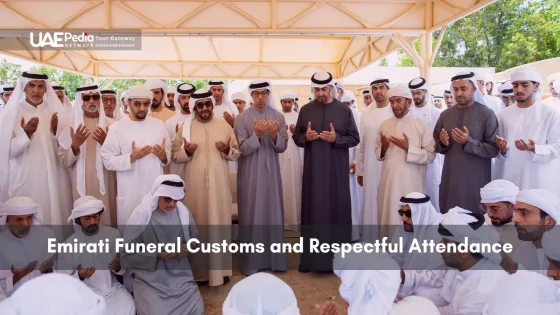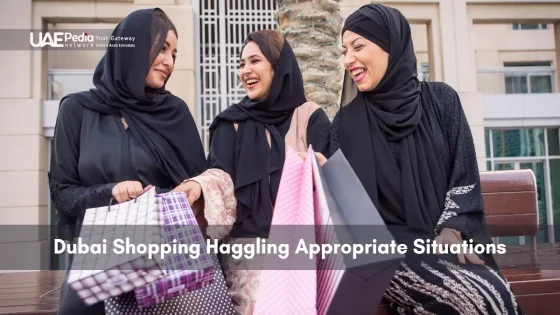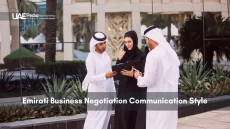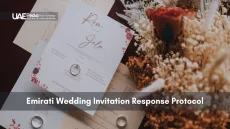How do we navigate moments of profound sorrow in a culture different from our own? In the UAE, moments of collective grief are shaped by deeply rooted traditions that blend faith, community, and quiet dignity. This guide helps you understand these practices with care—whether you’re offering condolences or attending a service.
Cultural sensitivity becomes vital during life’s most solemn occasions. Across the Emirates, rituals reflect Islamic principles and local heritage, emphasizing modesty, togetherness, and swift burial rites. For instance, services often occur within 24 hours, with men and women participating in separate gatherings to maintain privacy.
Attire matters here. Neutral colors like white or black are preferred, while flashy accessories are avoided. Visitors might bring simple gifts like dates or water to the family home, but flowers aren’t customary. The focus remains on quiet presence rather than elaborate gestures.
This article walks you through:
- The significance of timely community-led prayers and burial ceremonies
- How to express sympathy through actions rather than words
- Appropriate ways to support families during mourning periods
Consider this your roadmap for showing heartfelt respect—where tradition meets compassion.
Emirati funerals conform to Islamic jurisprudence: the deceased is washed, shrouded in plain white cloth, and buried within 24 hours. Services are gender-segregated, held in mosques or family courtyards, and emphasize Quranic recitation and silent communal presence; open-casket viewings are absent.
Attendees wear loose, muted attire, remove shoes before prayer areas, and silence all devices. Condolences are brief (“Allah yarhamu”), physical contact is minimized, and gifts consist of dates or water, not flowers. Post-burial, families receive visitors for three days; sustained support—meals, handwritten notes, weekly check-ins—continues through the 40-day mourning period.
A Closer Look at Funeral Traditions in Emirati Culture
Why do we fold origami cranes in Japan or light candles in Mexico? Every culture has its own language for grief. In the UAE, practices blend Islamic teachings with communal care—a quiet harmony you’ll recognize in global traditions like Hindu cremation rites or Jewish shiva gatherings.
When Faith Shapes Farewells
Islamic principles guide many rituals here. The body is washed and wrapped in plain cloth, mirroring simplicity seen in Buddhist funerals. Men often carry the deceased to the burial site, while women offer support through shared meals—similar to how Hindu communities bring food to grieving families.
- Head coverings (like hijabs or kippahs) signal respect across faiths during prayer.
- Separate seating for genders echoes Orthodox Jewish or conservative Christian services.
- Quick burial within 24 hours reflects urgency also valued in Zoroastrianism.
Islamic funeral traditions mandate swift burial within 24 hours, with the body ritually washed and wrapped in plain cloth, reflecting deep spiritual principles of simplicity and respect Ref.: “Memorial Planning. (2024). Islamic Funeral Guide.”
“Learn About: Emirati Religious Customs and Respectful Behavior“
The Quiet Power of Togetherness
Grief here isn’t a solo journey. Families gather for three days of condolences, much like Irish wakes. You’ll notice:
- No open casket viewings—focus stays on spiritual presence, not physical remains.
- Visitors might recite Quranic verses or sit silently, honoring the Buddhist value of mindful presence.
“Shared sorrow is halved,” says a local proverb. Whether you’re attending a service in Dubai or Delhi, showing up—modestly dressed, phone silenced—speaks louder than words. It’s how we stitch community into the fabric of loss.
Read More:
Practical Tips for Emirati Funeral Customs Respectful Attendance
In moments of loss, actions often speak louder than words. Knowing how to dress, move, and participate shows care beyond language. Here’s how to navigate these moments with grace.
Dress Codes: Modesty as a Universal Language
Clothing choices matter. Opt for loose-fitting garments in muted tones like charcoal or beige—bright colors distract from the solemn mood. Women should carry a scarf to cover their hair in mosques, similar to practices in Hindu temples or Orthodox churches. Men, avoid shorts or sleeveless shirts. Pro tip: Remove shoes before entering prayer spaces, as you would in a Japanese home.
“Related Articles: Dubai Business Introduction Protocol and Hierarchy“
Silent Support: Behavior That Speaks Volumes
Turn phones off completely—not just silent—to avoid disruptions. Follow the lead of family members or religious leaders during prayers. If unsure when to sit or stand, observe others. A local imam once shared: “Presence is participation. Your quiet focus honors the occasion.”
- Arrive 10 minutes early—punctuality signals respect.
- Limit physical contact; a nod or hand over the heart replaces hugs.
- Whisper brief condolences like “May peace find you” instead of lengthy speeches.
Avoid bringing flowers—dates or bottled water for the family home are kinder gestures. When in doubt, mirror what others do. As one Dubai resident put it: “Shared silence can be the deepest comfort.”
Respectful engagement during UAE funeral services prioritizes quiet presence, minimal physical contact, and following the lead of family members and religious leaders Ref.: “Religious Studies Center, BYU. (n.d.). Death and Dying in the Middle East.”
Related Topics: Dubai Personal Space and Cultural Norms“
Step-by-Step Guide to Respectful Engagement at Emirati Funerals
When words feel inadequate, knowing how to act becomes our bridge of compassion. Here’s your roadmap for honoring traditions while offering quiet solidarity.
Before: Mindset & Practical Prep
Start with attire—think muted tones and loose fits. Pack a scarf (even if you’re not Muslim) for mosque visits. One Dubai local recalls: “I once saw a visitor fold their jacket into a makeshift head covering. The family noticed—and appreciated—the effort.”
- Silence your phone entirely—no vibrations.
- Memorize simple phrases like “Allah yarhamu” (May God have mercy).
- Bring dates or water, never flowers.
| Do | Don’t | Why |
|---|---|---|
| Arrive 15 mins early | Enter prayer spaces mid-service | Maintain flow of rituals |
| Follow gender seating | Initiate physical contact | Reserve personal space |
| Remove shoes at entry | Wear perfumes/colognes | Avoid sensory distractions |
Preparation for UAE funeral services requires specific cultural knowledge: silencing electronic devices, learning basic Arabic condolence phrases, and understanding appropriate gift-giving etiquette Ref.: “ResearchGate. (2021). Islamic Processes for Managing Grief, Loss and Death.”
During: Presence Over Performance
Services move swiftly—often under 30 minutes. Mirror others’ actions: stand when they stand, bow your head during prayers. A visiting nurse shared: “I once panicked about missteps. Then I realized—my silence spoke louder than perfect gestures.”
UAE funeral services are typically brief and structured, requiring visitors to be attentive, adaptable, and respectful of established cultural protocols Ref.: “FOUAHFS. (2025). Cultural Sensitivity in Funeral Services: Why It Matters.”
After: Sustained Support
Visit the family home within three days. Bring practical items like disposable plates or tea. Avoid phrases like “Let me know how to help”—instead say: “I’ll drop by meals each Thursday unless you prefer another day.”
- Send a handwritten note—emails feel impersonal.
- Check in weekly for 40 days (traditional mourning period).
- Share fond memories of the deceased when appropriate.
Extended mourning support in UAE culture involves consistent, practical assistance over a 40-day period, demonstrating community solidarity beyond immediate grief Ref.: “National Center for Biotechnology Information. (n.d.). Muslim Customs Surrounding Death and Bereavement.”
“Read Also: UAE Eye Contact Cultural Significance“
Final Thoughts on Honoring Traditions and Embracing Respect
Grief reminds us how deeply we’re connected—across languages, borders, and beliefs. In the UAE, honoring traditions isn’t just about following rules. It’s a shared language of care that comforts families and strengthens communities.
Simple gestures carry weight here. Choosing muted clothing, arriving early, and silencing phones show respect without words. Bringing dates instead of flowers or offering practical help—like meals—aligns with local values of modesty and support.
Funeral traditions in the UAE represent more than ritualistic practices—they are a profound expression of cultural compassion, community resilience, and spiritual connection Ref.: “ME Assistance. (2025). Funeral Services in Dubai: A Guide for Expat Families.”
Remember: presence matters more than perfection. Whether joining prayers or sitting quietly, your effort to adapt speaks volumes. These rituals—swift services, gender-specific seating, and community-led support—reflect a culture where togetherness eases sorrow.
Let this guide be your companion in cultural learning. Bookmark it, share it, or revisit it before attending a service. Every tradition we honor becomes a bridge—not just to others, but to the universal heartbeat of compassion.
Ready to explore more? Let’s keep discovering how respect transforms moments of loss into connections that endure.
Opt for modest, loose-fitting clothing in dark or neutral colors. Women often wear abayas and headscarves, while men choose white kanduras or simple suits. Avoid flashy accessories or bright patterns—think understated elegance that honors solemnity.
Unlike Western traditions, flowers aren’t typical here. Instead, consider donating to charity in the deceased’s name or offering practical support like meals. If unsure, a heartfelt “Inna lillahi wa inna ilayhi raji’un” (Quranic verse for loss) shows deeper cultural awareness.
Women typically gather separately to recite prayers and comfort each other, while men handle burial preparations. During condolences, avoid physical contact unless initiated by family members. Follow lead cues on seating arrangements—many mosques have designated areas.
Remove shoes before entering the majlis (reception area), keep visits brief (15-30 minutes), and focus on listening rather than offering advice. Phrases like “Allah yarhamha” (May God have mercy) or “Sabr” (patience) resonate deeply. Return for subsequent visits—grief here unfolds over weeks, not days.
Absolutely, but prioritize discretion. Stand quietly during janazah prayers without participating, and avoid photographing gravesites. Some families may limit attendance to close relatives during actual burials—always defer to their wishes without taking it personally.
Islamic tradition requires swift burials, often within 24 hours. Expect last-minute notices—flexibility matters. Memorials (aza) continue for three days post-burial, with communal meals at sunset. Arriving 10 minutes early shows respect, but never earlier—families need privacy for preparations.
Avoid probing questions entirely. Emirati culture treats death as divine decree—focus on celebrating the person’s life and legacy. Share positive memories if you knew them, or simply say, “Your loved one’s impact remains through those they cherished.”
















